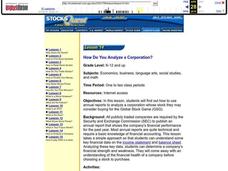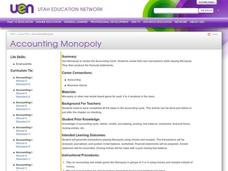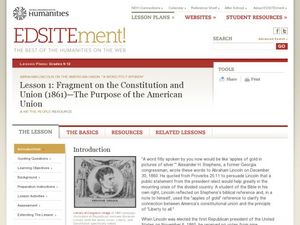Curated OER
Preparing an Income Statement
Tenth graders discuss the contents of income statements. In this accounting instructional activity, 10th graders are introduced to the parts of an income statement. Students practice filling out the four parts of an income statement,...
Curated OER
How Do You Analyze a Corporation?
Students analyze corporation whose stock they may consider buying for the Global Stock Game (GSG).
Curated OER
How Do You Analyze a Corporation?
Students find out how to use annual reports to analyze a corporation whose stock they may buy for the Global Stock Game. They read the investor information section, which provides detailed information about the company's products and...
Curated OER
Accounting Monopoly
Young scholars use Monopoly to review the accounting cycle. They create their own transactions while playing Monopoly. Students produce the financial statements that will match the transactions of the game.
Curated OER
Using Credit: Not for a Billion Gazillion Dollars
Fifth graders explore the concept of credit. In this consumer education lesson, the teacher uses the book Not for a Billion Gazillion Dollars to lead the class in a discussion about credit, debit, and income. Students then analyze their...
Curated OER
Analyzing Graphs
In this statistics and probability worksheet, students analyze frequency distribution tables or histograms and box and whisker plots. The two page worksheet contains four multiple choice questions. Answers are included.
Curated OER
Financial Statements For A Proprietorship
Students are introduced to how to successfully set up a propietorship. Individually, they complete a pre- and post-quiz to determine how much they know about the material. To end the lesson, they practice reading a financial statement...
Curated OER
Jesse's Big Change
High schoolers explain assets, liabilities and expenses. They record information on income statements and balance sheets and brainstorm opportunities to make money work for them.
Visa
Nothing But Net: Understanding Your Take Home Pay
Introduce your young adults to the important understanding that the money they receive from their paychecks is a net amount as a result of deductions from taxes. Other topics covered include federal, state, Medicare and social security...
Curated OER
The Power of Graphical Display: How to Use Graphs to Justify a Position, Prove a Point, or Mislead the Viewer
Analyze different types of graphs with learners. They conduct a survey and determine the mean, median and mode. They then identify different techniques for collecting data.
Curated OER
Oceanography Worksheet #1
If you are teaching physical oceanography to middle school earth scientists, here is a terrific multiple choice worksheet. Learners look at a diagram of a landscape created by glacial sediment deposition and the resulting ocean floor....
Curated OER
Profit and Loss
Young scholars analyze the concept of profit and loss, the components of a simple profit and loss statement and the importance of a profit and loss statement. They calculate profits using gross income, total expenses and cost of goods...
Curated OER
Fragment on the Constitution and Union (1861). The Purpose of the American Union
Eleventh graders examine how President Lincoln formulated the principles of the Declaration of Independence as the goal of the American Union. In this American Government lesson, 11th graders read and analyze primary sources based on...
Curated OER
Checking Sources For Accuracy
Middle schoolers will paraphrase a resource without plagiarizing. Then rewrite after reading text. They then evaluate the site or reference they are using for accuracy. In the end, they complete a note-taking organizer.















